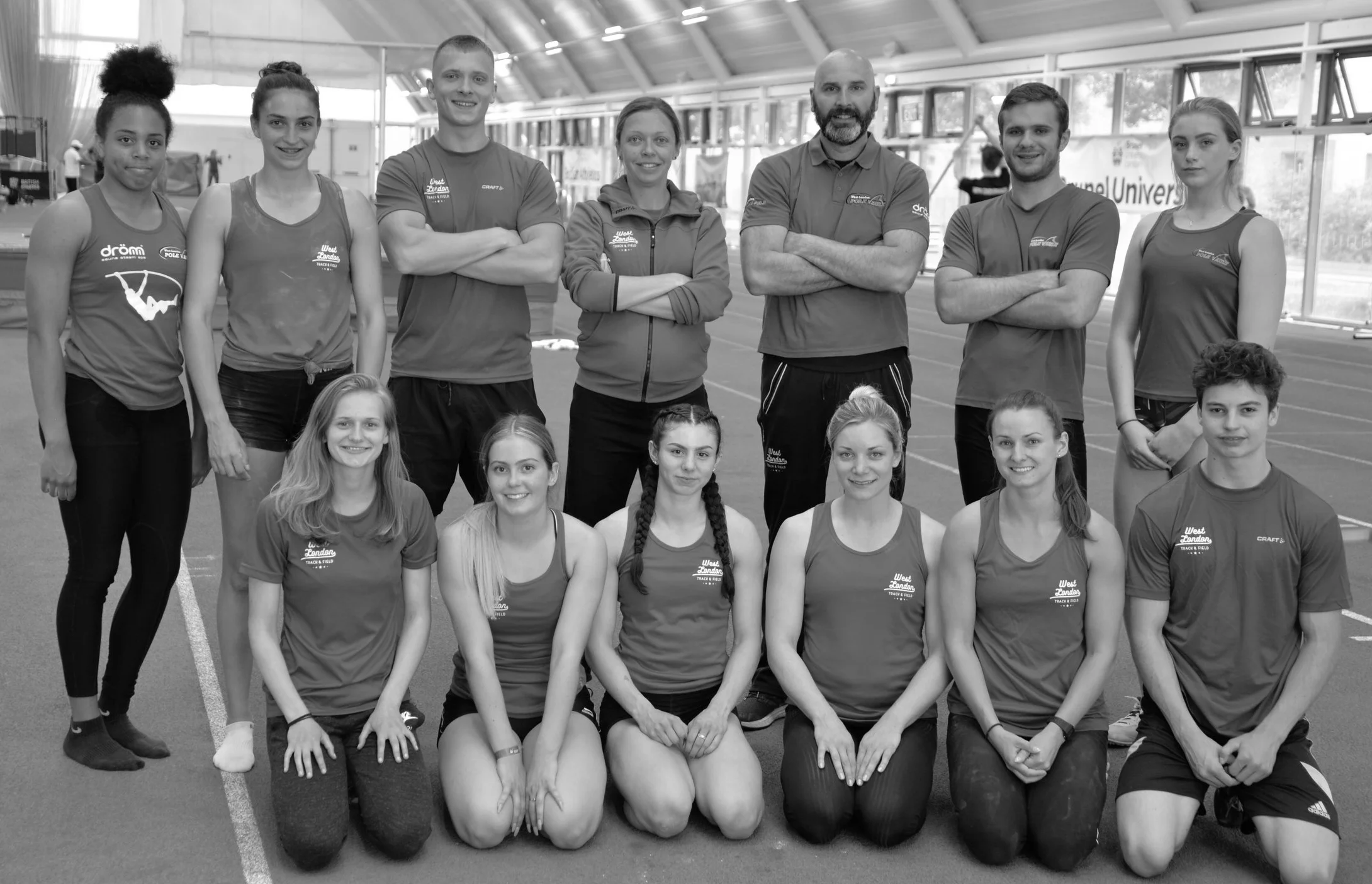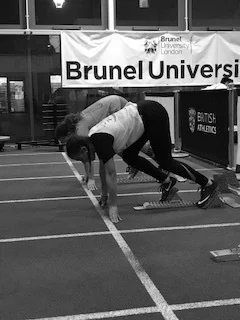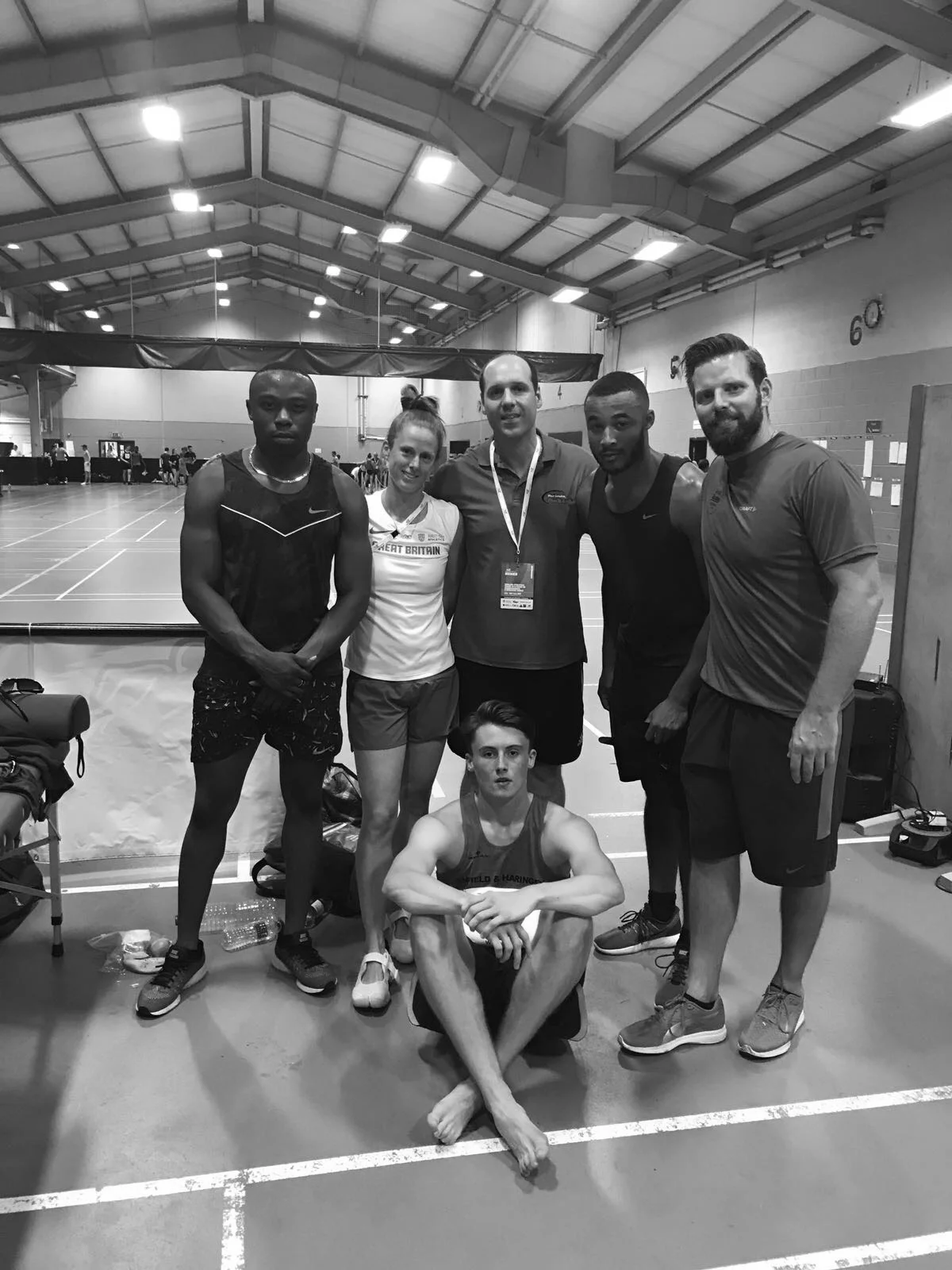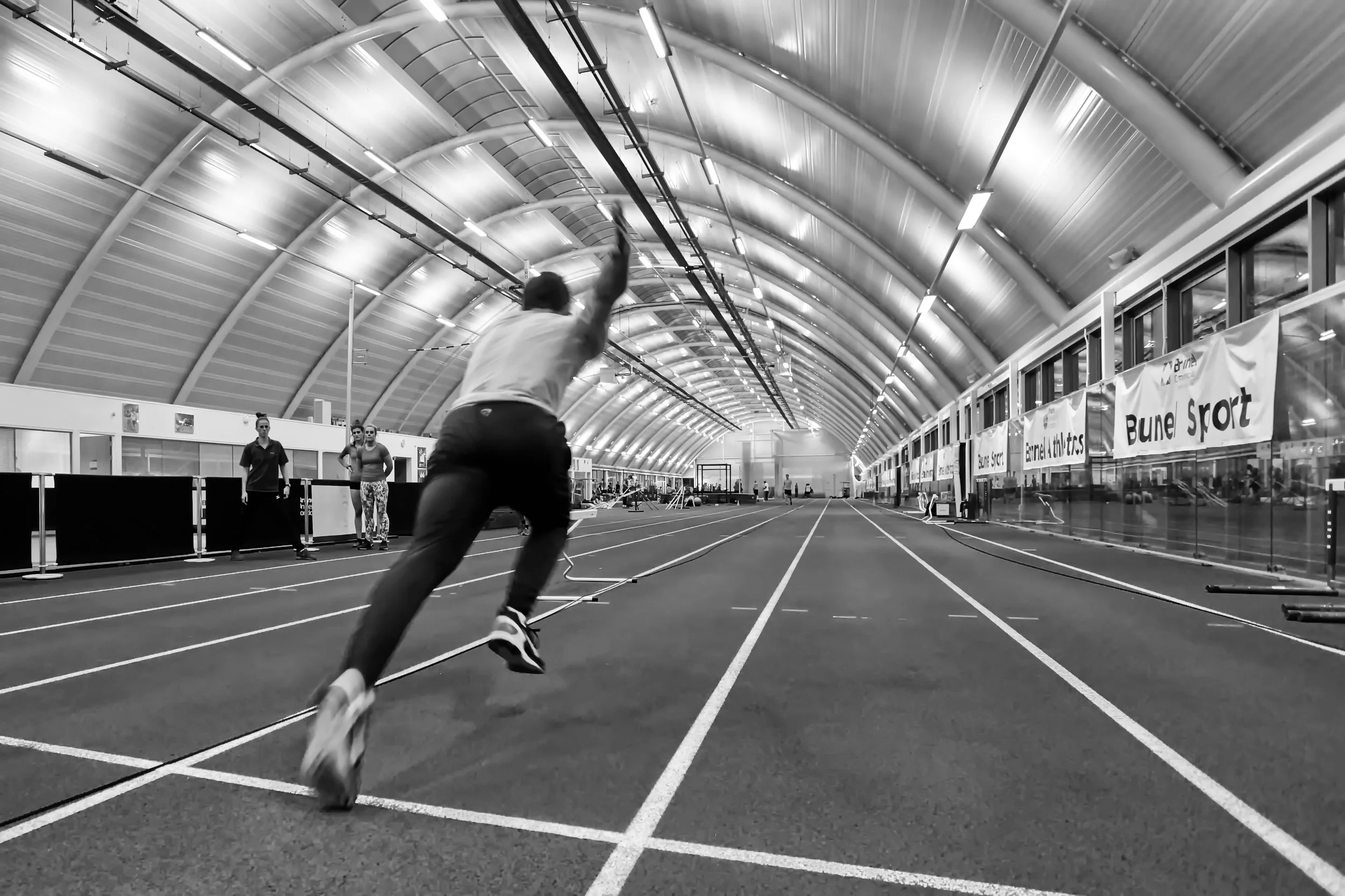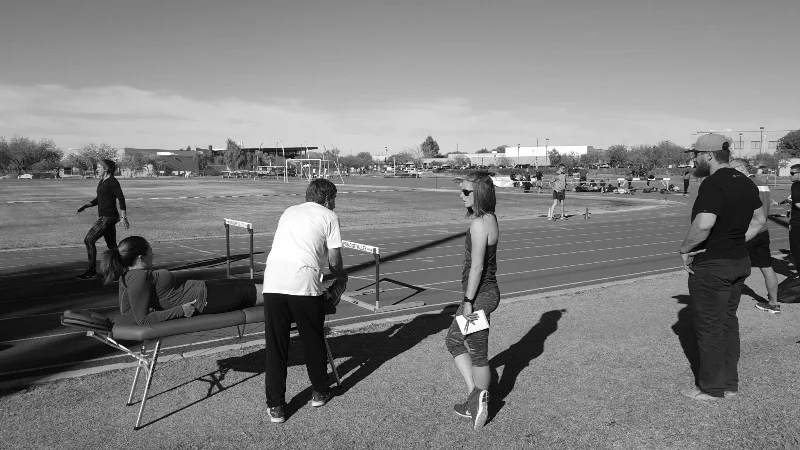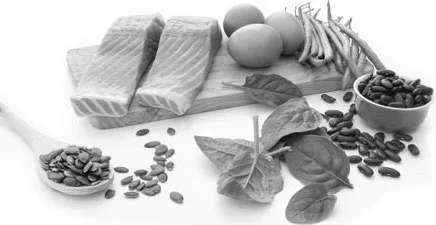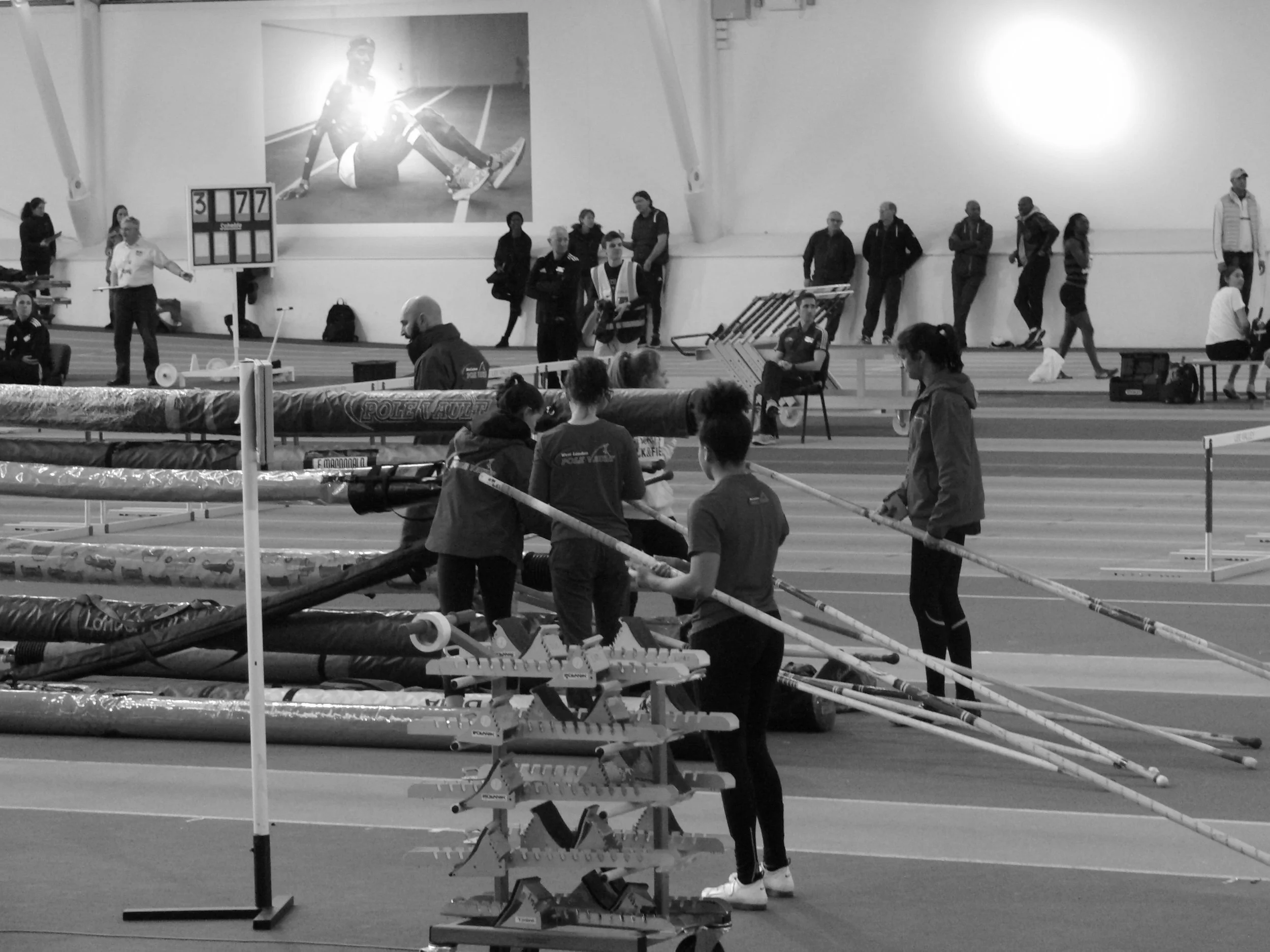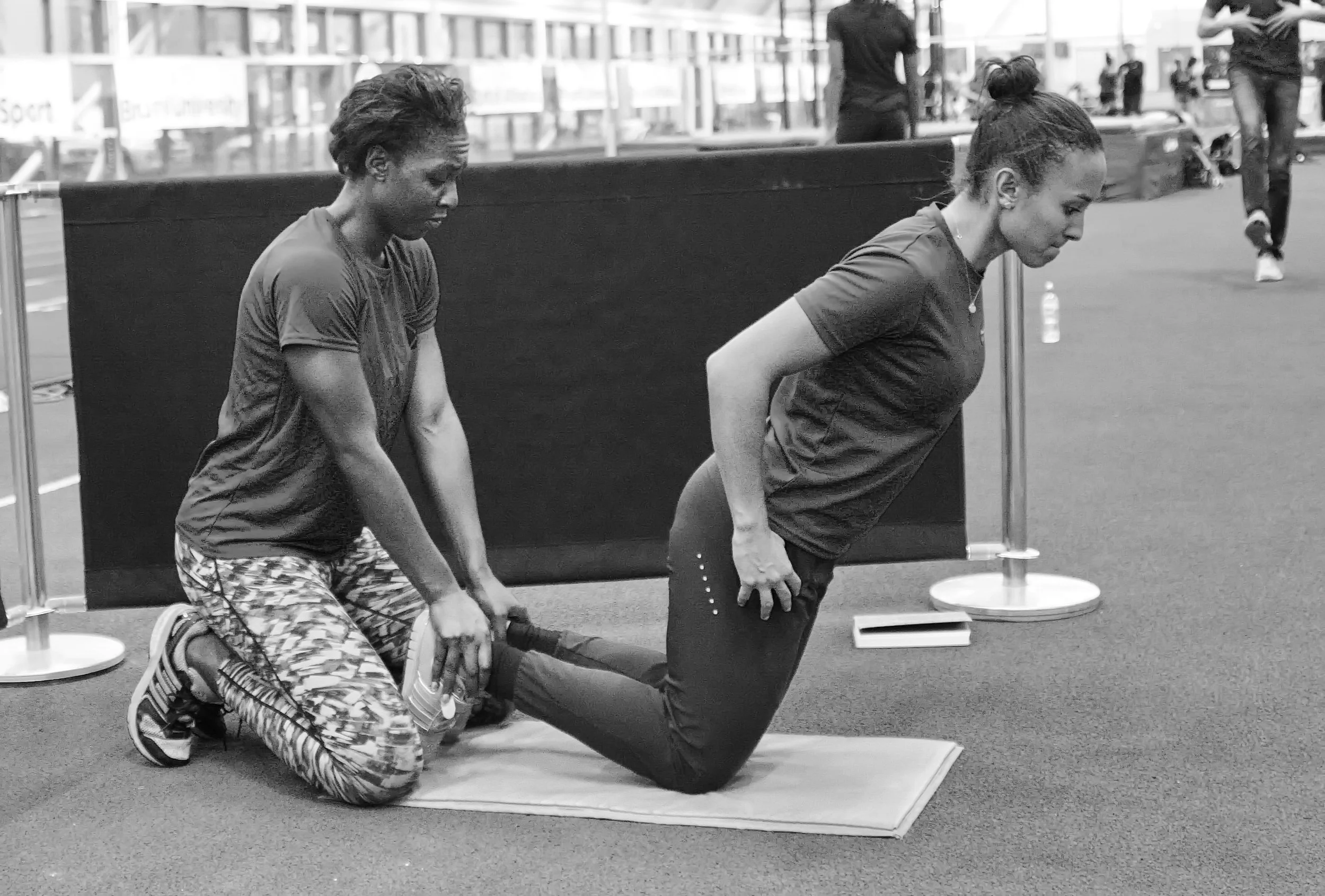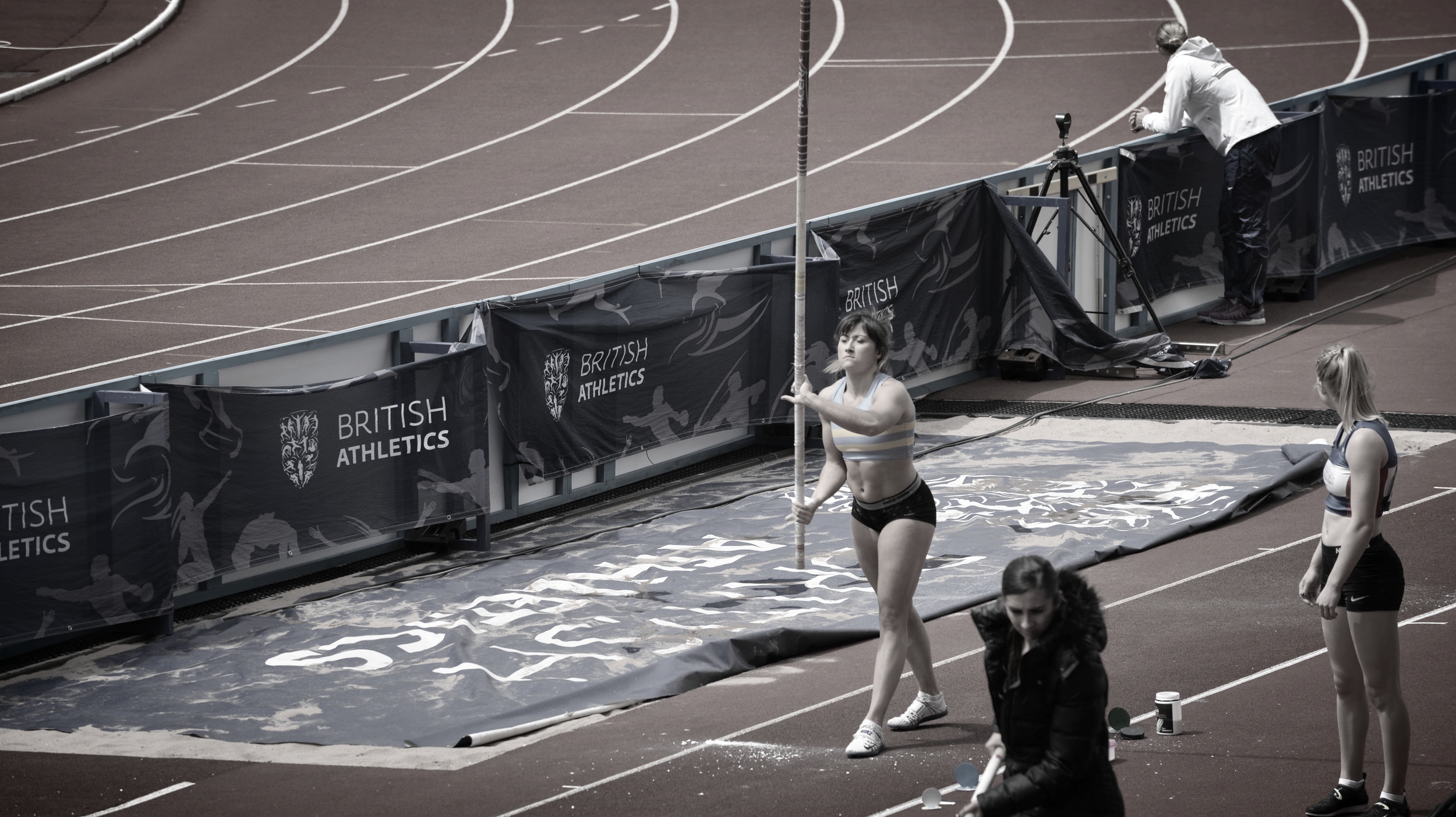A look back at a WLTF Coaching Internship, with 2017-2018 Intern - Kathi Lohr.
Viewing entries in
Sprints & Hurdles
WLTF launches new Sprints & Hurdles Squad for U15, U17 & U20 athletes.
Following the ongoing success of the current squads, Lead Coach Laura Tuner-Alleyne is delighted to now expand the team of coaches working with West London Track & Field’s Sprinters and Hurdlers.
The new squad will train 3 days a week (Monday & Wednesday 6pm, Saturday 10am) at Brunel University. Track and gym sessions will be programmed with the individual in mind and supervised throughout. With speed at the heart of the training programme, Laura and her team will ensure athletes develop technical mastery, as well as the physical and mental prerequisites for success.
The coaching team has been hand-picked to ensure the WLTF core values are at the heart of the squad, and will be tasked with the delivery of a comprehensive, individualised programme, designed to maximise long term athlete development:
Sprints Coach – Charlie Craddock
Hurdles Coach – Amanda Williams
Strength & Conditioning Coach – Antonia Gregoriou
For more information on joining this or any other squads and the associated coaching fees, please contact Laura laura@westlondontrackandfield.com
At the European Under 23 Championships in Bydgoszcz West London Track & Field had representatives both competing and coaching. Head sprints & Hurdles coach Laura Turner-Alleyne was a member of the coaching staff and sprinter Clieo Stephenson was a member of the 4x100m relay team. After the championships we sat down with Clieo to ask her a few questions on her experience at the championships.
Clieo with WLTF Lead Therapist - Gareth Degg
Thanks for taking the time to talk with us today Clieo. What were your immediate thoughts when you found out you had been selected for the team?
I had very mixed emotions when being selected for the team. Due to an injury that developed at the beginning of the season, I found it difficult to achieve my goal of running in the individual 100m race. However, despite not running as fast as I had hoped this season, it was still an honour to be selected for the relay and I was excited to experience my final age group international championships.
Did you have to change any of your plans for the season and if so how did you do this?
My training with Laura is extremely planned, so I had known what my season looked like way before the season had even begun. However, being selected for various teams including being invited to run in Geneva, Switzerland, were things we were not able to plan for. This meant I was running on weekends I had not planned to run on and having to pull out of other competitions to do so. When invited or selected for other competitions, Laura and I would always ensure that changing my plan would benefit my season. If it would benefit my build up to the European Championships, then I would adapt and fit my schedule around that change.
Was this your first time competing for Great Britain at an age group championships?
No, I had been lucky enough to represent Great Britain at the European U20 Championships in Rieti, Italy in 2013 on an extremely successful team! The experience however, was very different this time round with the athletes allowed to be more independent!
How helpful was it having your coach as a member of the team staff?
I loved having my own personal coach there with me as it allows me to treat the championships just like any other competition I would do in the UK. With Laura being an experienced athlete herself, she understood the demands and was able to share her experience with both myself and the other members in the team. It’s great because Laura is able to monitor my build up and suggest any changes or adaptations to my preparation when she is at the championships too.
“With Laura being an experienced athlete herself, she understood the demands and was able to share her experience with both myself and the other members in the team.”
What did you find most difficult about being away?
The most difficult thing for me is getting used to a different bed! If it’s not what you are used to, it can be difficult to get sleep on the first couple of nights. I would suggest bringing your own pillow just in case the pillows are not to your taste! Also, the food in other countries can often be not to the standard you would hope when you are competing. However, in Poland the food at the hotel was great!
Clieo with WLTF head sprints & hurdles coach - Laura Turner-Alleyne
What would your advice be to any young athletes that have ambitions of competing for Great Britain?
My advice would be to not change anything that is working for you. To be world class and represent your country, it does not mean doing different things that may work for one person and not for you. Everybody works and thrives differently, so if it works for you, keep doing it.
How are you going to use your experiences from the championships to help you continue moving forward with your training?
I am going to take the positives of being selected to motivate me going forward in my training. Although I may not have got the selection that I wanted, not being able to compete to my best ability and still be selected is promising. It excites me for the future as I know that when I am able to fulfil my potential, I will be exceeding my expectations and goals!
With less than a month to go for most in the 2016/2017 season, we would like to wish everyone the best of luck with their final competitions of this year. If you are interested in joining West London Track & Field please contact us via the following emails:
Sprints & Hurdles - laura@westlondontrackandfield.com
Pole Vault - ellie@westlondontrackandfield.com
WLTF is set to launch it's first full-time Sprints and Hurdles squad.
Following three successful seasons working with over 30 athletes, Lead Sprints Coach - Laura Turner-Alleyne is now directing her focus and expertise to coaching a group of athletes dedicated to training full time.
WLTF Sprinter Clieo Stephenson & Gareth Degg
Turner, an Olympian and GB Team relay coach is set to lead a squad of committed athletes through a comprehensive, individualised, programme designed to maximise performance.
The new squad will train 5 days a week (Monday, Tuesday, Wednesday, Friday & Saturday) from 10am – 1pm. Track and gym sessions will be programmed with the individual in mind, and supervised throughout. With speed at the heart of the training programme, Laura and her team will ensure athletes develop technical mastery, as well as the physical prerequisites for success.
Therapy support will be provided by Gareth Degg (lead therapist WLTF) who has already had an amazing impact on the quality of athlete movement and performance in his 3 years in post. Gareth is an Osteopath and Movement specialist, and his philosophies around movement and performance are a common thread in Laura’s training programme.
The WLTF core values will be at the heart of the squad:
Precision – purpose, pride and precision in everything we do.
Dedication – to commit to do everything to the best of our ability.
Respect – for ourselves, for others, for the sport.
Perseverance – taking ownership of challenging situations and working towards solutions.
Excellence – chose to work towards excellence in all areas of life.
For more information on joining this squad and our other squads, coaching fees apply, please contact Laura laura@westlondontrackandfield.com
This weekend twelve West London Track & Field athletes will head to Birmingham to compete at the British Outdoor Championships. With seven athletes from the sprints and hurdles group and five pole vaulters, this is the most athletes that West London Track & Field has had at a British Championships.
Here are the events that we'll be contesting:
Men's 100m:
Marvin Popoola - Coming back into form after a few years of injury woes, Marvin ran a seasons best of 10.62 at the under 23 National Championships and will be looking to improve this again in Birmingham.
Jahde Williams - Fast improving in his less favoured sprint event. Jahde ran a personal best of 10.73 at the Under 23 National Championships to make the semi-finals.
Women's 100m:
Clieo Stephenson - Fresh from her bronze at the Under 23 National Championships, Clieo is looking to build on a consistent first half of the season in which she has ran 11.7 on two occasions.
Shereen Charles - Experienced sprinter who thrives on the big occasion and will be looking to break the 12 second barrier when it counts.
Men's 200m:
Marvin Popoola - Running two personal bests at the Under 23 National Championships including a time of 21.27, Marvin will be aiming to run faster again in Birmingham.
Jahde Williams - In his more favoured of the two sprints, Jahde ran a personal best of 21.55 from lane 1 at the Under 23 National Championships. Lots more to come.
Men's 110H:
Jack Kirby - A finalist at the Under 23 National Championships and a former GB Under 20 representative, Jack will be aiming to get closer to the 14 second barrier this weekend.
Reece Young - Another finalist from the Under 23 National Championships. Reece ran a PB to make the final in his first race of the season. He'll be hoping to build on this in Birmingham.
Men's 400H:
Max Schopp - Max is in his first season with West London Track & Field and has run consistently close to his PB every race. He'll be looking to break this over the weekend.
Courtney MacGuire - Bronze medallist from the Indoor British Championships
Men’s Pole Vault:
Max Eaves - Max will be hoping to go one better than his silver medal from the indoor championships. Having already contested numerous British Championships, Max will be looking to step up again in Birmingham.
Women’s Pole Vault:
Henrietta Paxton - Coming off of back to back season’s bests including a commonwealth games qualifier of 4.25m, Hen will be looking for another strong performance over the weekend.
Jessica Robinson - Jess won a silver medal at the Under 20 National Championships and will be aiming to back up this performance with her efforts at her first British Outdoor Championships.
Courtney MacGuire - Courtney will be hoping to add another medal to her collection after winning a bronze medal from the Indoor British Championships.
Sophie Dowson - Sophie won a bronze medal at the Under 20 National Championships with an outdoor seasons best of 3.75m and will be hoping for another season's best at her first British Outdoor Championships.
With just one day to go until the action starts at the British Senior Championships this weekend - for an unprecedented seven WLTF sprinters and hurdlers - we sat down with Head Sprints and Hurdles coach, Laura Turner-Alleyne, to explore her coaching philosophy.
Laura, thanks for taking the time to speak with us today. What does an outline of the season long programme for the West London Sprints and Hurdles groups look like?
Laura Turner-Alleyne
When I started coaching, one of the first coaches I researched was Charlie Francis. I could relate to his short to long principle and decided I wanted to base the programme around this approach. This allowed me to work on the technical elements as I had hoped and also try and break out of the “tough training makes you tough” mentality (which I hate, by the way). So with our programme you are either running fast, or you’re running easy. There was no in between. I want the athletes to appreciate “tough training’ comes in many forms. You do not need to be throwing up after every session to be working hard. Tough training should be mentally challenging, breaking habits, challenging thought processes, prolonged periods of concentration. Finding and maintaining correct sprint mechanics is “tough”.
Our structure does not change very much through the year. We work with a specific theme for each of our 4 days of training. Monday, speed. Tuesday, tempo and conditioning. Thursday, acceleration. Saturday, speed/technical endurance. Each high intensity track session (Monday, Thursday, Saturday) is followed by a plyometric activity and a short gym session which follows the same theme as the track session. For example a speed day will have a fast, single leg/split stance lift as the primary movement.
How much of your programme do you change from one season to another and do you find that you change less as you gain more coaching experience?
In our third season, our programme has maintained its structure. The content has changed slightly, as you would expect, as the team learn from our experiences with the group and from our continued reading and conversations around many aspects of coaching. I would say the main change year to year so far has been the volume of training. I am constantly trying to strike a balance between too much and too little volume and the form that volume takes. I am learning that there is not one answer to the volume debate. It depends on the athlete. So I tend to programme different options for athletes depending on what they need and what their body can handle. Some can handle volume in the form of tempo/easy runs, others need the hard speed endurance, some can handle neither.
Our programme has an increasing influence from our lead Therapist, Gareth Degg. The more I work with our therapy team the more I appreciate how important it is for the athletes to be moving well. Everything we do from the warm up to the conditioning session has been influenced by Gareth and his movement strategies.
“I am constantly trying to strike a balance between too much, and too little volume, and the form that volume takes.”
How much does your training programme for the athletes you coach change during different times of the season?
During competition season I will plan the athlete’s week depending on their race schedule. Other factors to be considered when planning training around races are:
- How much gym work is needed? Minimal effective dose, males versus females, strength versus elastic athlete
- Increase plyometric activity if gym work reduces
- How many times a week running fast? Some athletes can only run fast 1/week which may mean only on race day and not at all in training during the week
- Maintaining volume versus reduced volume; some respond better to maintaining a level of volume in the programme, some need to reduce volume
- Competitive training sessions; some respond well to these, others don’t
All in all, this leads to many hours spent carefully planning each athletes race preparation and myself and the other coaches having to be masters in multi-tasking at training sessions.
WLTF sprinters working on acceleration
How important do you think it is for athletes to be aware of what stage of the season it is and how this should effect their perspective & how do you communicate this to them?
As a coaching team, we work really hard on making sure mechanics on the track and movements in the gym are optimal. This requires attention to detail, video review, clear communication and accountability from both athlete and coach. The longer we work with an athlete the clearer we can see what type of feedback they respond better too. Some athletes are thinkers and like internal cues, others respond better to external cues. This is not to say we use either one or the other, both are required at certain times and for certain aspects of training.
Sprinter Clieo Stephenson after winning a bronze medal at the Under 23 National Championships
When we get to competition season I try to keep the majority of cues external and limit the amount of video footage I let the athlete look at during training. Small tweaks and reminders may require a small degree of internal cueing, but generally we use external cues. I tend to use warm weather training in April as my last chance to make any big technical changes we need to address before competition starts. After that, I am just trying to maximise the model they have been working on for the past 6 months.
During race season, athletes will always want to watch video footage or talk about every step of their 150m rep, I simply keep answers short and make sure they have a very clear objective (just one) for each run. I will also not show them video if I do not want them to see it, I haven’t had too many athletes struggle with this concept. They understand my reasons and respect my judgement.
How do you manage athlete’s mind-set during competition season and do you find that it is harder for them to be more process driven during this time of the season?
Managing an athletes mind set has been the biggest challenge I have faced as a coach (so far). Whilst studying for my BSc and MSc I chose the hard sciences, completely disregarding the psychology modules. At the time, I was an international athlete and found it hard to get my head around all the theories these modules threw out. Looking back now I wished I had taken at least one of these modules!! The majority of my reading is now around psychology and coaching science, I find it really interesting and the most relevant area to delve into working as coach.
Every athlete responds different during competition season and as such, needs to be handled differently. Those who know me will know my militant approach to most things, stemming from my days as an athlete. Some athletes respond really well to this and can relate to that mind set. This is not the way to bring out the best in everyone, so I am constantly having to manage my approach to sessions, feedback, race warm ups and debriefs. This is by far the most changing aspect of coaching and, in my opinion, is the difference between an average coach and a great coach.
Thanks again Laura for providing an insight into what the training for our sprinters and hurdlers looks like. The seven athletes from the sprints and hurdles group will be joined in Birmingham by five pole vaulters from West London Track & Field and we'd like to wish all twelve athletes the best of luck!
This week's post is written by West London Track and Field Assistant Coach - Mikel Perry. After originally joining West London Track and Field as an intern Strength & Conditioning Coach, Mikel is now a permanent member of our coaching staff each week and assists both the Sprints & Hurdles and the Pole Vault groups.
Mikel Perry
I started working with the sprints and hurdles side of WLTF in September 2015. I had always wanted a chance to get involved with sprinting, as I find the purity of the sport fascinating, particularly from a strength and conditioning perspective. At the time, I was also finishing my MSc in Sports Medicine, so was keen not only to see how the sports medicine and coaching teams work together in the real world, but also to get involved and help integrate the rehab and performance elements.
The year started with the coaching team all getting to know each other, talking through the basic plan for the year and then looking more in depth at our first block of training. Initially my role was primarily focussed on providing strength and conditioning support to the athletes in the gym and helping out with testing. My role with the track work was to watch and learn; trying to absorb Laura’s coaching philosophy, seeing how the technical elements are executed, and just as importantly, getting to know the athletes.
Initially, the idea of coaching the athletes for their sprint work was daunting. Whilst I understood the basics of sprint mechanics and some of the various elements that we were trying to work on, I struggled to actually see these in real time with an athlete sprinting in front of me. This was not like watching a footballer run (no offence meant!), all these athletes know how to run and most have a good enough understanding to know what they need to work on – my analysis needed to be on point! The answer to this (for me at least), was slow motion video. I was lucky enough to be able to watch the performance live, then watch it back, and finally chat to Laura about what she had seen and what she thought needed attention. I also found that this was a good chance for me to feed back to the athletes, chatting to them about what they could see and getting to know what they think about during their performance.
England Under 23 Champion Clieo Stephenson
Quite quickly, I started to find that I was picking up on things without the need to check the video. The next step was to figure out what to say to correct the things that I was picking up on. This is an interesting topic, as there are a multitude of different cues which get used by different coaches. Talking to all our coaches and listening to how and why they use certain cues was immensely valuable, as was talking about why they would not use certain other cues (no high knees cueing in our camp or Laura might jump out and get you!). I enjoy this side of coaching, as it requires a bit of creativity to figure out how to get the best out of somebody. You can have two athletes with exactly the same mechanical problem, but they may need two completely different solutions for them to be able to correct that problem.
A couple of months into my time at WLTF I was no longer just an S&C coach, but an active member of the WLTF team. I was starting to get to know the athletes better, getting to know the coaches better and beginning to feel like I was adding value to the track coaching. The next area which I was able to explore was the therapy side of things. Through my masters degree, I had sat in with many physios, surgeons and sports doctors, but never any osteopaths. Sitting in with Gareth (and later Jason too) gave me a chance to see how they think about issues, and talk to them about some of the specifics involving our group of athletes. It also gave me a chance to share some of my opinions, so that they got an idea of how I think and see what things I work on with athletes. Unfortunately injuries are a part of any high level sport, but having a cohesive team in place, in which individuals know their roles, is hugely beneficial for the athletes. The fact that Gareth and Jason have a wealth of experience with top level athletes has made it particularly informative for me, and I continue to benefit from having the chance to work with them.
Seemingly out of nowhere, it was competition time. Whilst training had obviously been building towards the indoor season, it still somehow surprised me. Being around the team during this time was particularly interesting. Seeing how people deal with pressure, how personalities change, how focus increases and then also seeing how people respond after whatever performance they are able to produce – be it good or bad. There is no hiding behind a team in this sport, just you against the clock and a few other athletes. Depending on the competition, it may be the time or the win which is most important, but the time never lies. If you ran slow, you ran slow. If you made a clear mistake or you aren’t 100%, that may not bother you too much, but if that is unexpected, it can knock your confidence. As a coach, finding the right balance between giving people space, critiquing, and providing support and positivity was, (and in fact still is) no easy feat.
WLTF sprinter Luke Sargeant in action
Thankfully, the indoor season went well and on we went. Although the emphasis of training was continually shifting, the rest of the year including the outdoor season, felt more like a steady progression. This time was more about continuing to improve my track coaching, and taking on a bit more responsibility for rehabilitation and injury prevention. I was also at university more, which actually tied in very nicely (given that I was taking Injury prevention and Rehabilitation modules), allowing me to put real world problems to my lecturers. On a side note - a quick mention of the UCL Sports and Exercise Medicine MSc is worthy, as it has provided me with a level of understanding surrounding injuries, which now feels completely indispensable. Having a better appreciation of the anatomy, mechanisms of injury, the structural damage which injury causes, and the way that different tissues heal and adapt to loading, has definitely made me a better strength and conditioning coach.
Going back to the end of the year… The outdoor season went very well. We seemingly had personal bests at every competition, with very few injury problems. It’s amazing how emotionally vested you become in a short space of time, just from seeing the hard work that has been put in and getting to know everyone. I have to say a big thank you to Laura, Sam, Tim, Gareth, Jason and all the athletes, as I learnt a lot from everyone. It was a great end to my year and although I wasn’t sure what the following year would hold, I hoped to remain a part of WLTF and get a chance to continue to build the programme – Little did I know I’d be working with the pole vault side of WLTF too, more on that another time!
To hear more from Mikel, you can follow him on twitter: @MikelPerrySandC and to keep up to date with everything that's happening at West London Track and Field, give us a follow: @WLTrackField or like us on Facebook.
Our post this week comes from West London Track and Field Performance Therapist Gareth Degg. Gareth achieved a master of osteopathy degree from the British School of Osteopathy and also has a keen interest in biomechanics and human function. Gareth is trackside on a weekly basis and works with the other therapists and coaches to ensure athlete movement is optimal.
Performance therapy team in action at Lee Valley earlier this year
As competition season has sprung into action, the role of a therapist will be as equally important as the off-season time. The role of a Performance Therapist is a position that has become more noticed and more popular over the last 5 years. Especially considering the work done at Altis and British Athletics who employ therapists from a number of different professions as performance therapists. People have different views about the responsibilities of performance therapy and the pros and cons of the whole process, but I will only give my opinion in this short article about performance therapy and then more specific competition therapy.
What is Performance Therapy?
The initial role of a therapist, whether that is an Osteopath like myself or any other profession, is to consider the health of the patient. In that respect the role is no different than if you are in a clinic and a member of the general public walks in and seeks treatment for an ailment.
In a sports setting the chances of seeing injuries are quite high and these are what we spend a large portion of our time dealing with, whether that be a hamstring issue or a shoulder complaint for example.
However, everything previously mentioned is what happens in a normal clinic setting and the question of where does ‘performance’ come into the role arises. I feel that Performance Therapy is where you go beyond injury and pain as your measuring tool for success. The responsibility has to shift to you having an appreciation and understanding of the function and movements required in the athletes’ event and knowing what should be happening and what should not. Then you may choose to make a therapy intervention to improve a movement pattern or action, which then theoretically leads to an improvement in performance.
This is why a performance therapist needs to be present at training, competitions and forge a good open relationship with both athlete and coach. All three elements need to be communicating and be on the same page with the same goals in mind.
Head sprints and hurdles coach Laura Turner-Alleyne with Altis head coach Dan Pfaff in Phoenix
Competition Therapy
On the day of competition it is my belief that the therapy team play a different role to normal training days. On normal training days often the therapy team will spend most of their time with athletes that are either recovering from injury or have some specific issues that need attention. Competition day is all about the athletes that are competing on that day and this is all about maximizing an athlete’s performance; performance therapy in its truest form.
What happens on competition day?
By the time an athlete gets to competition they should be free of injury and fit enough to compete first and foremost. So the focus then is aimed at maximizing their body to its potential. A basic outlook of a competition day for a therapist will be as follows:
- Set-up and make your athletes and coaches know where you are
- Find out what time your athletes are competing and what time their call room is.
- Find out what time athletes plan to start warm-up
- Plan what athletes you want to assess prior to warm-up
- Watch warm-up and drills where possible
- Therapy intervention where indicated
- Repeat throughout the competition
How is competition different from training?
The stress of competition will affect each athlete differently and sometimes this can become an issue. Due to stress or performance anxiety the athletes mind can play tricks on them and they can present all kinds of symptoms or potential injuries that are often perfectly fine. In this situation your role is to reassure the athlete and give them the confidence to compete.
On the flip side you may have an athlete that is too aroused for the competition and they are “bouncing of the walls” and it may be your responsibility to bring them back down a little before they mentally fatigue themselves before competition.
How much therapy work should be done on competition day?
Simply put, it depends.
There are a few things to consider on the day:
Time – There may only be a 5-minute window during an athlete’s warm-up for a short intervention. It has to be meaningful.
Individual athlete – Some athletes require more attention than others from both a biomechanical point of view and an emotional one.
Goal/aim – Athletes are preparing to compete so the interventions have to be geared towards the end goal.
Our performance therapy team are trackside on a weekly basis
Things that I avoid on competition day
Again, this is only my personal opinion and other therapists may do things differently, but there are a number of things I try not to do prior to competing:
Treatment Time – I believe on competition day that therapy interventions should be short, concise and outcome driven. If an athlete is requiring masses of treatment before they are about to compete then the question needs to be asked, “Are they fit enough to compete?”
Treatment type – I personally do little to no massage style soft tissue work prior to competing. I will do soft tissue release work often on the day, but this will not be in the form of the long stroke massage techniques as I feel this will not optimise the muscle for what we are about to ask it to do. Simply put, a massage helps to relax the muscles, creates a parasympathetic response in the body and often gives the body a feeling of rest. This is great post competition to aide recovery and regeneration.
Prior to competition the body needs to be alert, aware, activated and primed for what is about to happen.
That is a brief overview of my feelings towards competition-based therapy. The key point that I need to reinforce is that most importantly you have to have both a sound understanding of the athlete and their chosen event in order to make good choices when deciding whether a therapy intervention is needed and what to do.
Max Eaves training at Solent HPA
This past weekend at the British Universities Championships we sat down with Dan Cruse and Jordan Niblock of Solent University's High Performance Academy (HPA) team and heard their thoughts on the best ways for athletes to improve their performance. The team at HPA have worked with West London Track and Field pole vaulters Max Eaves, Courtney MacGuire, Laura Edwards, Kieran Apps and Dan Hoiles - three of whom opened their outdoor seasons with new personal bests over the weekend.
Here are their top 10 ways that you can improve your performance:
Willingness to Learn - A common trait among all great athletes is an insatiable desire to get better. Each training session and competition is a fantastic opportunity for you to learn and improve – imagine how much better you could be if you embrace this for the rest of your athletic career?
Open To Constructive Criticism - This is very important in our opinion, and something that a lot of athletes can struggle with. Part of the learning process is being able to take on board constructive criticism, and harness that as fuel to improve in future sessions and competitions. Good coaches have your best interests at heart, any criticism is designed to help you get better - not as a deformation of your character!
Get On Top Of Your Nutrition - An easy way to gain an advantage on your competition, given it’s a performance variable often overlooked by a lot of athletes. How can you expect your mind and body to perform at its best, if you’re fuelling them with foods that give you nothing in return?
WLTF athlete Laura Edwards - Student at Solent University
Surround Yourself With Like Minded People - “You are the average of the 5 people you spend the most time with” (Jim Rohn). Make sure that support network is allowing you to be the best possible athlete and person that you can be.
Don’t Cut Corners In The Warm Up - Sessions and Competitions start with the warm up – this is the perfect time to get your mind and body best prepared to go out and execute. Cutting corners and missing elements of your routine, just lends itself to poor preparation. Focus your mind on what you’re there to do.
Flick The Switch Approach to Training and Competition - This leads on nicely from our last point about not cutting corners. Some days, we don’t want to train. We don’t want to work, and we find distraction wherever possible. Flicking the switch affords us the opportunity to leave our bags at the door when it’s time to train, and make sure that we leave no stone unturned in the pursuit of excellence.
Courtney Macguire working with
HPA manager - James Grant
Use Your Time Away From Training - Every day is game day by Mark Versteghen summarises this point quite nicely. Time is a precious commodity, and recognising that every hour of the day is an opportunity to improve performance can help you get even more out of your training. Taking the time to consider things such as a bedtime routine, or even preparing food ahead of time can help to form long term habits which will make your time away from the track more productive. Count up how many hours you spend at training against how many you don’t, and then tell us you couldn’t be doing more!
Keep A Training Diary - Keeping a simple log of how long your sessions are and how hard they are on a scale from 1 to 10 is a great way to keep track of how much your training is progressing week to week, as well as showing trends in your wellness over the course of a season.
Ask Questions Of Your Coaches - Not surprisingly, coaches love what they do, almost as much as athletes love winning. Questioning the process may seem counter intuitive, but asking your coach about the rationale behind what you do in training is a great way to help reinforce your own understanding of how each session contributes to achieving your season goals. It also creates accountability for your coach as well. Some of the best changes we’ve made to an athletes programme have come off the back of their own ideas.
Play The Long Game - Nobody wants to be a glass cannon. Reframing adversity as opportunity is a great idea, rather than sacrificing long term progress for short term gain, which can cost you success in the long run. Not only that, but making sure you are consistently prepared to train and compete by managing your workloads and recovery strategies will mean more chances to succeed every season. So many potentially great athletes have their careers cut short by injuries and setbacks that could have been avoided. Don’t let this be you.
Dan, Jordan thank you for your time and all the best to you and the athletes you work with on your future success. There will be plenty of West London Track and Field athletes hoping to maximise their own performance this weekend as they start their outdoor campaigns at their respective British Leagues and U.K Women's Leagues. Good luck!
Whilst away on warm weather training in Barcelona, we took the time to sit down with Commonwealth Games silver medallist Laura Edwards and ask her a few questions about what she thinks makes an elite level athlete.
Hi Laura, thanks for talking with us today. Firstly, what do you think athletes can do to engage with their coach more and what are your views on communication between athlete and coach?
I think in order for an athlete to engage with their coach they need to be willing to give more than what is expected of them. As an athlete you need to ensure you are focused during sessions and taking on board what the coach is telling you. Turning up unprepared or late can also show the coach you aren't organised or ready to work hard. You have to be accountable for what you are doing. Asking questions if you don't understand can also show the coach you want to learn and progress. This can all help you as an athlete show the coach you are serious about being an athlete and willing to commit to working hard. I also do think a good coach-athlete relationship is extremely important and can significantly impact an athlete’s performance. Athletes should be confident in their coach and having good communication between the two is key to it I think. Having a mutual trust and respect for each other can be so important and I think without that it can be difficult for an athlete to reach their full potential.
What do you think is important for athletes to consider when responding to feedback?
I think athletes need to understand that the feedback their coaches are giving them is to help improve their performance. It is beneficial to their growth as an athlete. When your coach gives you feedback you should acknowledge it as a challenge and a learning opportunity. You also have to make sure you act on what they are saying. I think you need to consider the fact that they aren't telling you something for you to just accept it and move on. As an athlete you need to do something with that feedback by being able to make the necessary changes in order to enhance your performance. It's also important to not take their feedback negatively as you have to consider that they are trying to make you into the best athlete you can be and they only want the best for you. By listening, accepting and acting on feedback athletes can learn from their mistakes and use it to better themselves.
Gymnastics, like pole vault, is an individual sport where athletes train in groups. Do you think it’s important for athletes to be their own person and be an individual whilst appreciating the support of the group?
Yes definitely. Participating in an individual sport means as an athlete you need to take ownership of your career. You need to take responsibility for performances and seeking ways to improve during both training/ competitions as well as your lifestyle. At the same time, I believe having great support from your team mates is second to none and vital in your success as an athlete. Having good teammates around you can help you become a better athlete as you can all work together bettering each other and creating a great environment to train in. It helps everyone as you are all pushing towards similar goals and understand what each other is going through.
Given the high performance environments that you’ve trained in, do you see a difference between what high level athletes are posting on social media and what they’re doing behind closed doors when training?
Yes 100%. I guess everything isn't always as perfect as it seems on social media. It's nice that social media allows more experienced athletes to broadcast aspects of their training to younger/ less experienced athletes. However, I think people just need to be aware it is only aspects and they don't show absolutely everything. Behind closed doors can be very different to what is actually shown. They may go through a lot and will only tend to post the positive or more exciting parts of what is going on. Basically, what you see on social media isn't everything there is to the life of a world class athlete.
What do you think separates those that go on to perform at an elite level and those that don’t make it and is it always the most physically talented athletes that go on to perform at elite level?
In my experiences within gymnastics there was often the physically naturally talented athletes winning at a younger age however, it was often the gymnasts who were always around but never quite there working hard, never giving up who came out on top. They weren't necessarily the most naturally talented to start with but from their committed, hardworking approach and mind set they eventually got to where they wanted to be. I think the athletes that perform at an elite level are very motivated and committed. They don't give up when things get hard, instead they use their failures to fuel them to do better and succeed. I think having the self-determination and mental toughness is a key factor to reaching a high level in sports. Training long hours and dedicating yourself to a sport can sometimes be draining and extremely tough at times but making it through those tough times is what makes achieving so great, especially in sports like gymnastics and pole vault. If it was easy, it would be boring. So, I think what separates those that make it to an elite level is the desire and passion they have to consistently work hard by doing what others aren't willing to do.
Thank you for taking the time to talk to us today Laura and all the best with the upcoming season!
Common barriers to athlete development.
The role of Vitamin D in athlete performance.
A Q&A with WLTF Vaulter - Mercy Gutteridge, on how to balance study and training.
An athlete's guide to fats and carbohydrates.
A multitude of Personal Bests were recorded at the London Indoor Games, this past weekend.
6 Medals won at the South of England U20 / Senior Championships.
English U23 100m Champion, Clieo Stephenson on her training at WLTF.
Rudyard Kipling's words applied to the world of Sports.


